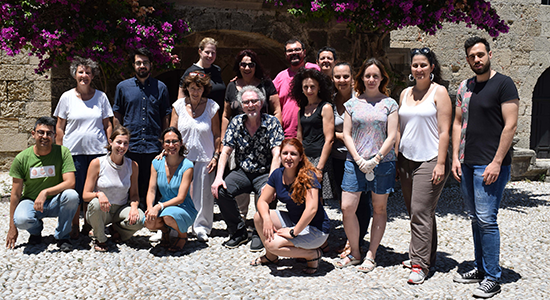The Rhodes Centennial Project – Shared Living Spaces: Six Building Complexes from the City and the Necropolis of Rhodes (3rd century BC - 2nd century AD)
The Rhodes Centennial Project is a collaboration, initiated in 2016, between the Saxo Institute (University of Copenhagen), and the Archaeological Service on Rhodes. It is directed by professor Vincent Gabrielsen. Conducted as an interdisciplinary undertaking, the project will revolutionise our understanding of the archaeology of Hellenistic and Roman Rhodes.

The focus and the outcome of the project will be the publication of six building complexes that have come to light in the past sixty years as the result of rescue excavations in the modern city of Rhodes. The project aims to study and to make a highly original and stimulating material available to the broader scientific community for the first time. In doing so, Rhodes will aptly once again be brought to the forefront of research in ancient history and classical archaeology, a century after Blinkenberg embarked on his pioneering Rhodian expedition (1902-1914).
The six complexes under investigation occupy an area of nearly 2000 m2, distributed between the two zones of the ancient city of Rhodes and its necropolis. Two of the complexesare located in the city, in close proximity to the Acropolis, and four of them in the ancient necropolis. The common feature of all these complexes is their communal character: the layout and the finds associated with the complexes point to buildings that were designed to serve the needs of groups and collectivities. A systematic and full publication of these complexes will clarify and illuminate their precise nature and function.
The project’s innovative objective is to study together and to compare archaeological and epigraphic finds from the necropolis and the urban centre of the ancient city. This unitary approach in the study of space, be it funerary, domestic or civic, will allow us to gain fresh insights into the social fabric of Rhodes by tracing developments and changes in two disparate, yet interconnected, spheres: the world of the living (the city) and the world of the dead (the necropolis). The systematic study and publication of the six complexes is of paramount importance (1) for apprehending the burial practices and customs perceptible in Hellenistic and Roman Rhodes, (2) for the history of Hellenistic and Roman architecture in the East Mediterranean, (3) for mapping the use and dissemination of material culture in the East Mediterranean (pottery, small finds etc.) and finally (4) for evaluating the impact of economic prosperity and social mobility on the Rhodian urban fabric.
Each of six sub projects investigate the finds from discrete building complexes, which are listed here under the name they have been given as excavation plots.
- The so-called sanctuary of the priests of Helios (Soichan-Minettou plot): In the 1950s, rescue excavations revealed a vast complex that occupies an area of ca. 1200m2 in the heart of the religious zone of the ancient city.
- ‘Mamaligka Plot’: In 2000, rescue excavations at the eastern foot of the Acropolis hill brought to light substantial remains of three rooms (ca. 3 x 5m each). They are aligned in a row and all opened into an atrium that gave access to a peristylar courtyard.
- ‘Papachristodoulou-Karika Plot’ in the western necropolis: In the early 1970s, rescue excavations in the western necropolis revealed a number of built structures enclosed by a precinct wall and lying in close proximity to shaft graves. Three U-shaped platforms, built and stuccoed, demarcate the south side of the enclosure. The platforms bear strong similarities to Roman triclinia (dining rooms), an architectural type that is thought to originate in the Italian peninsula (Etruria, Campania).
- ‘Yallousi Plot’ in the central necropolis: 13 chamber tombs with vaulted roofs have been unearthed in the central necropolis of ancient Rhodes. They are built in a row, to a total length of 30 m. The tombs formed part of the same burial complex: a portico runs along their façade, while a courtyard opens to the north. The tomb types consist mostly of loculi and cist graves.
- ‘Asvesti-Papaioannou Plot’ in the central necropolis: The funerary complex consists of a corridor-like courtyard (16.50 x 3.60m), surrounded by rows of chamber tombs on all four sides. The tombs are provided with elaborate architectural facades: Ionic semi-columns flank false-doors carved in stuccoed walls.
- ‘Kladogenis Plot’ in the eastern necropolis: In the early 2000s, a well-preserved funerary enclosure (9.20 x 8.10m) came to light in the eastern necropolis. The enclosure is aligned with loculi along all sides, and these are surmounted by a built podium, which served as a raising platform for the placement of tables and altars.
Contact
PI professor Vincent Gabrielsen
Project participants
Researchers from the Saxo Institute
| Name | Title | Phone | |
|---|---|---|---|
| Gabrielsen, Vincent | Professor Emeritus | +4529808841 |
Associated researchers
- Anastasia Dreliossi-Irakleidou
- Evangelia Dimitriou
- Marco Gargano
- Eriphyle Kaninia
- Nikos Litinas
- Maria Michalaki-Kollia
- Stella Palaiologou
- Vasiliki Patsiada
- Evangelos Vernarlis
- Portokalenia Vratsali
- Kristina Winther-Jacobsen
- Foteini Zervaki
Architect
- Panaghiotis Rovilos
Conservators
- Katerina Pezouvani (chief conservator)
- Evangelos Koufos
- Paraskevi Nikolaidou
- Chrysanthi Photiou
- Manolis Vafeiadis

